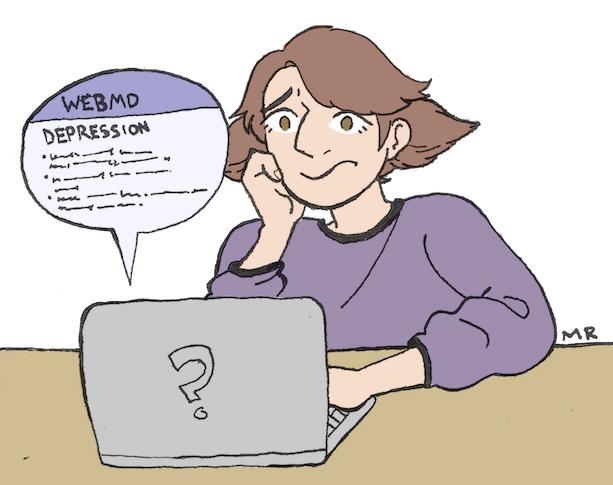Whether it’s a nagging cough, strange stomach problems or other aches and pains, we have all turned to the internet at one point to dissect the problem and find solutions. If you are anything like me, after googling your symptoms on WebMD, you will read the worst-case scenario and accept a grim fate. Now, not only are you bothered by your initial concern, but panicked and anxious about a new concern that you probably misdiagnosed. I see people do this all of the time for mental health concerns as well. As a therapist, nothing makes me happier than easy access to mental health education and open conversation about mental health. However, there are a few dangers of relying on the internet for your health education. That is why I am going to teach you an important lesson that trendy psychology is not telling you.
During grad school, I took an abnormal psychology course. I eagerly dove into my text book to learn about several mental health disorders. Mental health disorders affect your mood, thinking and behavior and cause impairments in your day-to-day functioning. As I was reading my text book, I began identifying with several mental health disorders and thinking they fit me perfectly. After two weeks, I had probably diagnosed myself with five disorders I did not really have. Then I remembered back to the first day of class when the teacher warned us not to get caught up in diagnosing ourselves or other people in our lives.
As we learn about mental health disorders, we have the tendency to see ourselves in them. Self-diagnosing provides instant relief and a simplified answer for complex symptoms. We feel validated and understood knowing that there is a whole group of people out there with our same concern. Human psychology is complex and rarely ever has one cause or one solution. However, the internet usually provides simplified explanations that are easy to relate to.
As humans, we are also prone to confirmation bias. Confirmation bias is the unintentional tendency to seek information that confirms our preexisting beliefs and ignore information contrary to our beliefs. People with mood swings may do a quick google search and conclude they have bipolar disorder. Additionally, you may see a commercial for a new medication that is promised to cure your symptoms. While medication is certainly a treatment option, there are many other options. A mental health professional such as a therapist, social worker, psychiatrist or psychologist can provide unbiased expertise to help you understand the bigger picture.
Another danger in self-diagnosing psychological concerns is missing a medical condition that is creating the physical symptoms. For example, thyroid imbalances can affect your mood and creates symptoms of depression, anxiety, excessive stress and intense mood swings. On the other hand, mood disorders can also affect the function of your thyroid. Having one does not mean you have the other. This is just one example of the importance of ruling out medical concerns when making a mental health diagnosis.
There have always been trends in psychology. The more people talk about a disorder, the more people are diagnosed with it. Currently, the term narcissism is very trendy. I am constantly hearing people call their boss, partner or any person who is highly self-centered a narcissist. Another example of this was increasing rates of the neurodevelopmental disorder, attention-deficit hyperactivity disorder (ADHD), in the 90s. As people developed a better understanding of ADHD and pharmaceutical companies developed medication, the rates of ADHD nearly doubled between 1997 and 2017. We do not know if this is because there were actually more children with ADHD or if there were just more children diagnosed.
There are claims that younger generations are increasingly misdiagnosing themselves with mental health disorders based on poor medical advice on TikTok and other social media platforms. Information on this topic is emerging so we do not know the full effect. However, I believe teens are especially vulnerable to misdiagnosing on the internet because they are in a developmental stage of understanding their identity, values and beliefs. Diagnoses such as ADHD, autism spectrum disorder and Tourette’s syndrome are highly popular on TikTok and Instagram. I see comical and educational videos on these topics with the intent to normalize characteristics of these diagnosis and shed light on topics that are misunderstood and stigmatized. It is great to see self-advocates sharing their experiences and creating a community for people to feel accepted. I also believe it is important that we are aware we cannot correctly diagnosis ourselves based on our favorite mental health advocate or influencer’s advice.
Don’t get me wrong, diagnoses are necessary. All of the disorders I mentioned are real and it is important to create accessible information. Diagnoses are not an identity, but a set of symptoms that fit you and guide the way to finding treatments and solutions. However, misdiagnosing can lead to the wrong path of treatment or convince you a lot more is wrong with you. Self-diagnosing without support can leave you feeling stressed and defeated.
To clarify, searching mental health education has a lot of benefits. With poor health insurance plans, clinics with long waitlists and costly medical bills, we need easy access to free mental health education more than ever, even if it is on the internet. I encourage anyone struggling with a mental or physical concerns to use all their resources- Google, books, friends, family, your favorite mental health podcast, etc. You can also check to see if your employer has an employee assistance program (EAP). An EAP is a workplace service, not connected to insurance plans, that helps employees and their families with stress-related situations and crises. This often covers mental health assessments and counseling sessions. Lastly, please remember it is okay to reach out to mental health professionals and remember, you are not alone.
Written By:
Jenny Birkholz, MSW, LGSW, LADC
Individual and Family Therapist
Lakes Center for Youth & Families


Recent Comments